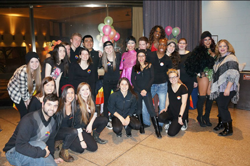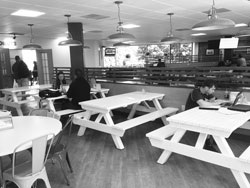“I’m gay.” These two tiny words, whether spoken out loud or simply thought, possess the power to dramatically change a person’s life forever. For 21-year-old Melissa Rance, they meant losing her home, but finding herself.
When you first look at Melissa, you see a beautiful young woman with light eyes, long hair, and a smile that is contagious. Her personality is that of a typical, happy-go-lucky girl, enjoying her junior year of college to its fullest. When you first look at Melissa, you would never guess the number of hardships she has endured that have caused her to mature far beyond her years.
“I’ve known I was gay since I was a little kid,” Melissa explained. “My close friends knew that I was gay, but I never had an official coming out until college, when I felt more comfortable with myself and who I was. I was lucky enough to have a more than accepting roommate, and joined a sorority with 70 girls who didn’t care about my sexual orientation and liked me for me.”
Growing up in a single-family household with her father and sister, Melissa’s sexual orientation was not a topic of discussion at first. Her sister, who is two years older than Melissa, moved out as soon as she graduated high school, while her father spent half his time working and the other half with Melissa’s stepmother and half-sister. “My dad was never very involved with my life or what I did, so it wasn’t hard to be with my girlfriend at the time and she was always over,” she said. “As far as he knew, she was just a friend.”
Circumstances took a turn for the worst when Melissa was 17. Her relationship with her father deteriorated, and he kicked her out of the house. “I moved in with my aunt, who my dad asked to ‘take me because he couldn’t deal with me or my issues’ and thought that I needed a ‘woman figure in my life to deal with the gay thing,’” she recounted.
Her aunt, Tracy Webb, was more than happy to take her in. “Melissa, or Missy, as that’s what she is called in our home, was just as eager to become part of our home as we were to have her,” Webb explained. “She came to us ‘closed’ but quickly ‘opened’ up to us.” Melissa acclimated to living with her aunt and learned to deal with social workers and DYFS because she was still a minor, but life settled down again for her. Then she ended up in the hospital for suicide.
The night it happened, Melissa’s father showed up at her aunt’s house to tell her she had to live with him again. Her father was accompanied by a police officer who asked her why she did not want to return to her old life. “I told him that my dad told me that I should kill myself so that the only mess he would have left to clean up of mine was my body.” When the officer asked her father if this was true, he just laughed. He then threw her father off the property and escorted Melissa to the hospital for evaluation even though she had not actually attempted suicide, despite her dad’s suggestion. Later that night, her father showed up at her aunt’s house yet again and told Melissa he knew she was gay. “I denied it because I was scared of what he might say or do,” she said.
According to Melissa, the events of that night were never really spoken about again, but her father now knows she dates girls and has become more accepting of it. This acceptance, however, has not made Melissa’s life much easier. Getting kicked out of her house forced Melissa to grow up a lot faster than many other teens. She was completely independent by age 17, working three jobs to pay for school, car insurance, and healthcare all on her own.
“I work as a dining associate 21 hours a week, I work on campus through federal work study 10 hours a week, and I babysit every week for seven hours,” she said. As a biology major with minors in psychology and sociology, she also has to worry about balancing all of this work with school courses. “In the summer I work 85-hour weeks so I can work less and manage 18 credits every semester,” Melissa explained.
This might seem like a lot to handle, but Melissa has a support system. “Melissa’s story is unlike any other,” said 21-year-old Victoria Porter, Melissa’s sorority sister and former roommate. “From the first day I met her, her strength shined through and I continue to admire her for the brilliant, caring woman that she is. I’m so proud of her for never surrendering to her battles.” She explained that, despite everything she deals with, Melissa is always a true friend and is there for Victoria just as much Victoria is there for her. “She has taught me so much about life, and is an inspiration.”
Melissa also has constant support from her aunt. “She quickly became one of my children, and more like a sister to my children,” said Webb. “She’s a jokester, our silly person, yet feels deeply for topics that mean a lot to her. I’ve watched her grow from a reserved and somewhat angry teen, to a loving, laughing, silly, smart and giving young woman. It’s hard to sum up our Missy, but we love her and can’t imagine our household, our family without her.”
With this giving personality that her aunt described, Melissa took her experiences and now uses them to assist others. Upon enrolling at Monmouth University, Melissa got involved with the All Lifestyles Included group, or ALI. “I wanted to help the group [ALI] further develop to bring change to Monmouth’s campus and emphasize human rights, which every person, gay, straight, bi, or trans, deserves.” She served as vice president of the organization in 2014, and was recently voted to be president come Fall 2015. Dr. George Gonzalez, ALI’s faculty advisor at the University, feels Melissa’s strong leadership has benefited the group. “ALI and the Monmouth community are lucky to have her serve in this way,” he said
“I’m gay.” These two tiny words permanently altered Melissa Rance’s life. “I have had people treat me differently after finding out, but there have also been so many people who have stuck by me and supported me for being who I am,” she said.
“I have learned through my experiences that good, kind people exist, and those who matter truly don’t mind. Being gay has shown me what it means to be the minority, to be the outcast, and the black sheep, but because of those I surround myself with, there are very few times that I feel like that person.”
PHOTO COURTESY of Melissa Rance




